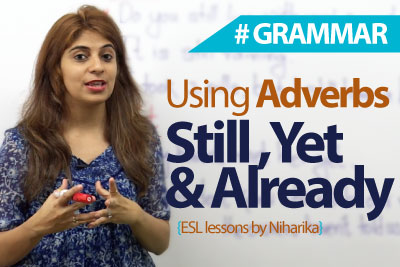Finished watching the lesson, now it’s time to take a test to see how much have you learned from this lesson.
[hr style=”single”]Three adverbs that often cause difficulty are still, yet, and already. They are all used when actions are going to happen, or are expected to happen, or were unexpected around the present time. Here we go into more detail about the difference between still, yet and already.
Still
Still – Still is used to talk about an action or situation which continues to the present because it has not finished.It often refers to something happening for a longer period than expected. Still is followed by a verb and sometimes by an adjective and it goes in the middle of a sentence.
Examples –
- Do you still live with your parents?
- I’m still upset with your behavior.
- It is still raining.
Yet
Yet – We use yet mostly in questions and negative sentences. Using yet shows that we are expecting something to happen or has happened. Yet comes at the end of a sentence or a question and is used with present perfect.
Examples
- Has he finished yet?
- Have they seen the film yet?
- They haven’t paid yet.
Often we use still and yet together in a sentence to explain why an action is being continued.
Examples
- I am still going to the college because I haven’t passed my last year yet.
- We still don’t know who will be our new boss. The owners haven’t told us yet.
Already
Already – We use already to talk about things that have happened often sooner than expected. It goes in the middle or at the end of a sentence just before or after a verb and is commonly used with the present perfect or past perfect. Already is also used to show surprise.
Examples
- She’s fixed it already.
- Have you both met already met?
- It’s 12’o clock already?
I hope this lesson clears your doubts about when and how to use these adverbs.

